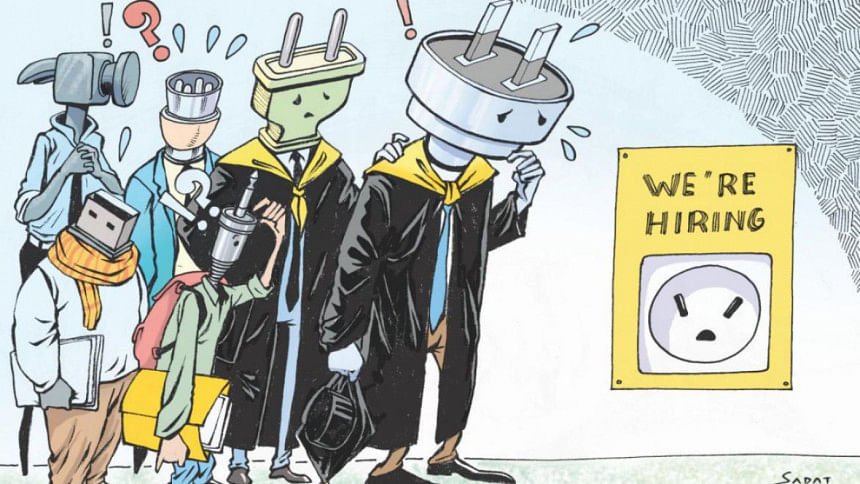Focus on a better skilled workforce

Education and skills are important prerequisites for faster economic and social development of a country. A skilled workforce is an asset and helps in ensuring enhanced productivity, adoption of new technology, global competitiveness, increased income and reduction of poverty. The East Asian countries achieved a higher growth path with adequate investment in skills development.
In Bangladesh, skills development is required in both formal and informal sectors for additional employment generation and on-the-job capacity building. In 2017, 86 percent of the total employed population aged 15 and above was in the informal sector as per the Labour Force Survey 2017, and this is why enough emphasis should be placed to build skills of those working in the informal sector in addition to those in the formal sector.
There are various actors in the field of skills development including those who deliver training for potential migrant workers. Technical and vocational training are provided by over 13,000 training centres in the public and private sectors and 1.3 million people received training on 87 trades in the country in 2017. This is, however, not enough to enhance the skills of existing and potential workforce in the country.
There are certain weaknesses in the skills development area such as lack of data, training programmes not matched with market needs, especially in the overseas markets, training courses not recognised internationally, quality of training varying greatly between providers, absence of standardisation of similar courses, etc. Poor skills training leads to low wages both locally and internationally. Many courses do not cater to the special needs of women and people with disabilities. Those trained in many cases do not get employment opportunities in the relevant field.
The Skills Development Policy, 2011 highlights the importance of a coordinated effort to contribute to attaining the country's middle-income status by 2021. The policy is intended to reach all relevant age groups with internationally comparable skills for both male and female population, disabled and socially excluded, workers in both small and medium-sized enterprises, and ensure resource availability based on type of skill requirement both domestically and internationally.
Bangladesh depends substantially on remittances received from its workers in many countries of the world, to meet its foreign exchange needs. It is extremely important to focus on skills requirements in these countries to improve foreign exchange earnings which is not growing at an expected rate. The Bangladeshi migrant workers' average annual per capita income is about USD 1,000 compared to USD 2,000 for India and Pakistan and USD 3,000 for Sri Lanka because 80 percent of our migrant workers are untrained. This shows a huge difference within the South Asian region which needs to be addressed through skills development of our people.
Several important trades that require skills development in Bangladesh are, for example, plumbing, welding, carpentry, TV and fridge repairing, wood carving, lacquer polishing, nursing, tourism, food processing, mobile phone servicing, electrical house wiring, glass and mirror fitting, masonry works, car and motor cycle servicing, tailoring and dress making, tiles fitting and steel furniture fabrication. Locally, vocational skills are required for diversification of export-based industries and internationally, for increasing wage levels of migrant workers. Skill enhancement in several international languages especially English and Arabic but also Spanish and French, are badly needed. In a globalised world, language skills can open up many avenues in international job markets for our people. Similarly, computer skills can enhance earnings through on-line job creation.
Despite the country's high growth rate of around 6 percent for many years and making remarkable progress in a number of human development indicators, we do not have a fully skilled workforce. There is also a mismatch between the demand and supply of skills and quality issues in many cases.
More and more skills development programmes are required in Bangladesh, especially with the help of government. Every upazila of the country needs modern technical and vocational training institutes so that people can have the opportunities to learn the trades of their choice at their doorsteps at an affordable cost. The 47 million youths of the country surely need to be equipped to face challenges of the future. According to the Labour Force Survey 2017, there are 63.4 million economically active population over 15 years of which 60.7 million are employed. There is under-employment and also many who are aspiring to change their jobs and move to high-paid jobs. The labour force of the country is growing at a rate of 1.3 million per year about half of whom are women. To achieve a better workforce, there is no alternative to building higher skills of the people.
Continuous job creation should be the foremost priority of the policy-makers to alleviate poverty by 2030. The Sustainable Development Goal 8 requires us to achieve full and productive employment, and decent work, for all women and men by 2030. For this, along with increasing the vocational training opportunities, formal education in colleges and universities need to be restructured further to cater to the needs of the modern times. The teacher training curricula should also be revisited regularly to keep up with the demand of the education system. Another area that needs strengthening is industry-based skills development programmes to cater to not only the present needs but also the future needs for workers. Collaboration between the government and various industry groups and chambers of businesses is essential to achieve this.
Dr Nawshad Ahmed is an economist and urban planner. He worked previously as a UN official in Bangladesh and abroad.





Comments